|
July, 2005
Aug. 2005
Sept. 2005
Oct. 2005
Nov. 2005
Dec. 2005
Jan. 2006
Feb. 2006
Mar. 2006
Apr. 2006
May 2006
June 2006
July 2006
August 2006
September 2006
October 2006
November 2006
December 2006
January 2007
February 2007
March 2007
April 2007
May 2007
June 2007
July 2007
August 2007
September 2007
October 2007
November 2007
December 2007
February 2008
March 2008
April 2008
May 2008
June 2008
July 2008
August 2008
September 2008
October 2008
November 2008
December 2008
February 2009
March 2009
April 2009
May 2009
July 2009
August 2009
September 2009
November 2009
December 2009
January 2010
February 2010
March 2010
April 2010
May 2010
June 2010
July 2010
September 2010
October 2010
November 2010
December 2010
January 2011
February 2011
March 2011
April 2011
May 2011
June 2011
July 2011
September 2011
ČERVENÁ BARVA PRESS NEWSLETTER
Gloria Mindock, Editor Issue No. 70 October, 2011
INDEX

October Červená Barva Press Newsletter 2011
Hi Everyone. It is such a busy time of year for everyone. There are so many events and readings happening.
Be sure to check out our readings page. If you want to be listed, be sure to send us your information.

October is fundraising month for Červená Barva Press.
Once a year, we ask for your help.
We need money to keep growing and to survive. We are an extremely active press, as you know. In these tough
economic times, we need help. Some of our books/chapbooks sell better than others. Running a press and
publishing books is expensive. Bill and I love what we do but it does not come cheap. With rising costs,
it becomes more and more difficult to survive.
We would like to remind you of our publishing record:
2005: 21 poetry postcards
2006: 4 chapbooks
2007: 10 chapbooks
2008: 19 chapbooks, 8 full-lengths
2009: 12 chapbooks, 9 full-lengths
2010: 12 chapbooks, 8 full-lengths
7 e-books (free)
So far in 2011: 5 chapbooks, 7 full-lengths
In Mid-October, we will be releasing two more collections...
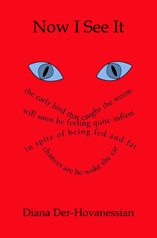
"Now I See It"
by Diana Der-Hovanessian
(full-length) |
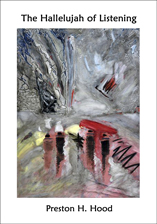
"The Hallelujah of Listening"
by Preston H. Hood
(chapbook) |
In November, "On Paths Known to No One" Poems by Flavia Cosma will be released.
So as you can see, we are very busy bringing you excellent work. Any amount you can help us out with,
would be greatly appreciated by the press. We appreciate anything!
It all adds up and helps us keep going. Cervena Barva Press Needs You!
This month, Červená Barva Press will be releasing a new book, Now I See It, by Diana Der-Hovanessian. The book
launch will be October 18th at The First and Last Word Poetry Reading Series. Here is the flyer and information on
the series. Harris Gardner and I hope to see many of you at this reading. Diana will be reading with
X. J. Kennedy and Fred Marchant. It will be a very special event...
THE FIRST AND LAST WORD POETRY SERIES
Hosted by: Harris Gardner and Gloria Mindock
THE CENTER FOR THE ARTS AT THE ARMORY
POETRY AT THE CAFÉ
191 HIGHLAND AVENUE
SOMERVILLE, MA
TUESDAY, OCTOBER 18TH
6:30 PM /ADMISSION: $4.00
READING AND OPEN MIC
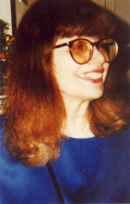
Diana Der-Hovanessian adds three new books to her publications this year with Dancing At the Monastery, (Sheep Meadow Press),
Armenian Poetry of Our Time, (California State University Press and NOW I SEE IT (Červená Barva Press, 2011). She has
poetry awards from the Writers Union of America, Writers Union of Armenia, Fulbright Commission, Columbia University,
the Paterson Prize. For 25 years she arranged poetry and panel programs at the Boston Globe Book Festival and the
Longfellow National Site for New England Poetry Club. http://www.dianaderhovanessian.com/

X. J. Kennedy, recipient of the PSA’s Robert Frost medal, since 1955 has been publicly reading and singing serious and
unserious verse. In a Prominent Bar in Secaucus: New & Selected Poems and Peeping Tom’s Cabin are recent collections.
His twenty children’s books are mostly verse; the latest: City Kids. He lives in Lexington.
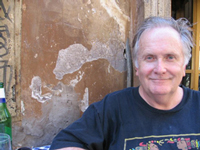
Fred Marchant has written four books of poetry, including Tipping Point, Full Moon Boat
and The Looking House.
He is also the editor of Another World Instead: The Early Poems of William Stafford, 1937-1947. Winner of the 2009 May Sarton Award
from the New England Poetry Club, he teaches at Suffolk University in Boston, where he directs the Poetry Center.
The Center for the Arts is located between Davis Square and Union Square. Parking is located behind the
armory at the rear of the building. Arts at the Armory is approximately a 15 minute walk from Davis Square
which is on the MTBA Red Line. You can also find us by using either the MBTA RT 88 and RT 90 bus that can be
caught either at Lechmere (Green Line) or Davis Square (Red Line). Get off at the Highland Avenue and Lowell
Street stop. You can also get to us from Sullivan Square (Orange Line) by using the MBTA RT 90 bus. Get off
at the Highland Avenue and Benton Road stop.
Look for interviews to come by Denis Nurske,
Goran Simic, and Luis Raul Calvo in future newsletters.
Červená Barva Press Author News
On Friday, September 23, 2011 @ Longy School of Music of Bard College, Cambridge, Massachusetts,
Mary Bonina addressed the Conservatory students in the Composition Seminar led by Jeremy Van Buskirk of the
Department of Theory and Composition. She also read some of her work from her two collections published
by Červená Bava Press, Living Proof and Clear Eye Tea. Dr. John Morrison, a composer who chairs the Composition
and Theory Department, invited Bonina to give a lecture on the creative process of poetry, and to engage the
students in a conversation about what the two art forms share and a dialogue about using poetry as the
inspiration for musical composition. The event was also attended by composer Paul Brusk, who has composed
work based on the poetry of Denise Levertov, who was one of Mary's mentors.
John Flynn's story, Boss Visa, which first appeared in the Istanbul Literary Review, is part of a
new anthology, just released, titled, A Small Key Opens Big Doors. The title is taken from a Turkish
proverb, and all the stories in the book center on Eurasia. Three years in the making, and edited by
Jay Chen, it's the third volume in a four-volume series of anthologies that cover the globe in celebration
of the 50th anniversary of the Peace Corps, which is this year. The book is available from Barnes and Noble,
or from Amazon. John's novel, Heaven Is A City Where Your Language Isn't Spoken is forthcoming
from Cervena Barva Press, and he will read from it on
November 15th at the Armory in Union Square, Somerville.
(191 Highland Avenue, Somerville, MA, 6:30PM, 11/15/11)
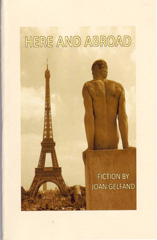
Saturday, October 15 · 7:00pm - 8:30pm
Joan Gelfand will read from Here & Abroad, a collection
of stories that won the 2010 Červená Barva Press Fiction Award.
She teaches for California Poets in the Schools. joangelfand.com
Other readers: Dorothy Hearst & Mary Mackey
Café Que Tal
1005 Geurrero St.
San Francisco, CA
Order Here & Abroad
I was so excited to have 10 poems come out in the anthology called "Hildagards Daughters" Six poets,
women of a visionary voice (Part of The Green Door editions (Belgium) I would like to thank the editor/publisher
Martin Burke. It is so exciting to be in this anthology with Flavia, Rodica, Mira, Jenny, and Camelia.
Check it out at:
http://issuu.com/delphicghentbooks/docs/hildagards_daughters
Please check out The Green Door:
http://issuu.com/delphicghentbooks/docs/the_green_door?AID=10752329&PID=3662453&SID=skim725X783301X5c9f273f9d0ab66a80fc5db3408dba27
Mary Bonina Readings
Friday, October 21 @ 7:00 P.M.
Mary Bonina reads @ Assumption College in Worcester,
at the D'Alzon Library
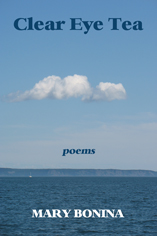

Mary Bonina has published poetry, memoir, and fiction in Salamander, Hanging Loose, Gulf Stream, many other journals,
and in several anthologies, including Voices of the City from Rutgers University Center for Ethnicity, Culture, and
Modern Experience. Winner of Boston Contemporary Authors, a public art project, her poem “Drift” was selected to be
inscribed in a granite monolith now permanently installed outside a busy Boston subway station in Jamaica Plain. Bonina
is a fellow of the Virginia Center for the Creative Arts and is a member serving on the Board of Directors of the Writers’
Room of Boston, Inc. She holds an M.F.A. from the Program for Writers at Warren Wilson College.
Order Clear Eye Tea

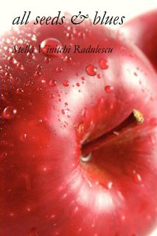
all seeds & blues by Stella Vinitchi Radulescu
Reviewed by Ralph Pennel
The poetry of Stella Vinitchi Radulescu's book, All Seeds and Blues, is ruminative in its slow, deliberate
examination of the thing desired, while simultaneously approaching the state of desire itself. The works haunt, and
are haunted by, the worlds, the states of being they are assuming and being denied access to, both.
Though Radulescu's poems, in form, are themselves not narratives, they disabuse the reader of the notion to not seek
out narrative. For, there is as much meaning in what has not been said as there is in what has been said, the very places
where only our own lives will serve to inform us of each poem's meaning, sometimes literally:
I stepped into the day weightless deathless
A sound on the brink
Of nowhere
The cracked mouth: (p.43)
This "sound on the brink," this "cracked mouth," this threshold between what has and has yet to be willed is where we
will find ourselves in every poem. Each word, each poem, holds the promise of salvation from that which has not been
uttered and the consequences of everything before and after that has. At every breath, each word, each poem, each combination
of poems is all at once the thing each desires to define and everything else, too:
onion soup and the death of a child
have in common
five o'clock news it snows-
it snows in one place
the brain keeps snowing
everywhere (p. 53)
Each word is seed and the sowing of the seeds. The poems, the sentiments they interminably represent, are the blues.
The words in these poems must germinate, must have time to germinate before they yield fruit, before they sustain us.
They must take root. In this way, they hold the promise of every harvest and the fear of long winters following failed
harvests. They hold "little hope first then no hope at all / and we stay in line / waiting for something" where, though
we can count on "one two three / four never arrives" (p.36).
These poems work tirelessly to shoulder out some room in a world that ceases to resist its own weight. In this way, the
work is informed without once being nostalgic for it, by the landscapes and heritage Radulescu's Romania: complicated,
fiercely independent, loyal to its own identity despite the centuries of occupation and war, where "people in our town /
they are still building bridges of blood" (p.47), where "one says that cut off from the world, the body / still grows" (67).
The work is both intensely personal and universal at the same time, the way peering into a microscope forces our gazes
downward and out. And when we look up from Radulescu's work, we can't help but feel we understand the world that much
better for having gazed so long on the intricacies of its least speculative narratives, saved from a "death by exposure
to dreams" (p. 6).
Order All Seeds and Blues at Amazon.com.

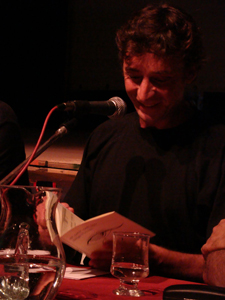
How has your poetry evolved, from the first to the last book published?
One never really knows who one is, where one is and what one is doing. Just as some try to build self through language
(a voice in a specific era), work processes and creative possibilities of language are what drive me. Poetry is what leads
us, consumes us; pulls out lives with passion. This poetic vitality comes from an act of intelligible reason. I don't
believe in poetics emerging from logical speculation: perhaps this drive to write can be managed rationally, but it loses
poetry in the attempt, putting a ceiling on it.
I believe in what Eduardo Milán says in his book Resistir. Insistencias sobre el presente poético - Resist. Insistence on
the poetic present (the word Latin American should be added), where he speaks about poetry, about being erratic and about
the poet as a wanderer that speaks. A poem as something that strays implies the end of reality dependent poetry.
Placeless, only the poet derives, or according to Gilles Deleuze and Félix Gautarri, "evolves;" becomes something else;
goes from identity to identity, in continuous motion. In that endless wandering the poet loses identity and the poem loses
its speech holder. There is no longer an identity: there are identities. There is no longer a reality to be obeyed: there
are realities and they are all interchangeable depending on where the poet is in this true flight from an absent center.
("Resistir. Insistencias sobre el presente poético," article by Eduardo Milán. FCE, Mexico, 2004.)
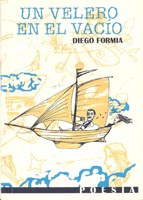
My books: Un velero en el vacío - A sailing boat in the emptiness (1999, Rio Cuarto municipal printers) was my first book
and while it is genuine and potent, I particularly try to transmute pain, it has many technical issues since at that time
(nowadays I can see this as an adolescent pose) I didn't pay much heed to the formal aspects of poetry.
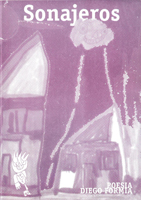
Then came Sonajeros - Rattle, a book-album (published in 2002 by Universidad Nacional de Rio Cuarto) which was envisaged
as a game for children and is thus naïve, a deliberate pose aimed at creating a close knit world, a world of positive
options in a country that is falling apart at the seams, a place where children, family and friends dance around in a circle.
The texts of Sonajeros were created to be read and to be put to music (and embody my continued interest: in the quest of
language interchange in order to explore possibilities of expression that I've always shared with artists from other disciplines).
All the poems from the book were read and recorded in an experimental album that completes the volume.
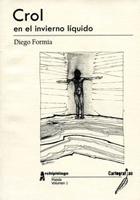
Then came Crol en el inviernolíquído - Crol in the liquid winter (2006, Cartografías Editora) which is a plunge
inwards, a character who lies on his bed and can't or doesn't want to get up, an existential minimalist; it breaks
abruptly with the "children's party" style of the previous book by going to the other extreme, one of questioning
loneliness and anxiety.
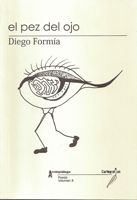
My latest book is El Pez del ojo - The Fish of the eye (2010, Cartografías Editora) that has
strong unity among its poems. It takes past poetic resources (like alliteration, for example) to express the
contemporary; under the idea that the "the only truth is overall illusion" that is expressed in poetic images,
in the sense that the eye and the organs of perception are imperfect and that physics, that studies the structure
of matter through its subatomic theories, has discovered the quantum vacuum of "things." This is something that
physicists find hard to explain because it is of admirable beauty and will, at least I believe, end our strong
materialistic influence in understanding the universe.
What has been your experience with regard to cultural animation?
I have discovered three passions in my life, of course with different drivers and intensities: poetry, communication and cultural
animation. I discovered the latter about ten years ago and this is in fact one of my tasks at the Municipality of Rio Cuarto.
While cultural animation is today a full study subject (my specific training is in social communication) I think the main thing
here is to have wide-ranging culture, sensitivity regarding social processes in order to know which are the relevant cultural
facts (culture in terms of values and as in any activity developed by man) that need to be promoted within a specific society
based on their concrete social developmentneeds. And with regards to promotion, here an artistic-social aspect in termsof
creativity comes into play.
For example, the annual poetry conference held for the past five years in Rio Cuarto; the Encuentro Nacional Aguante Poesía- National
Poetry Encounter emerged at a time when, together with others (always with others, because cultural animation is not just one type,
from one enlightened visionary, it is precisely a social matter) we started to deliberate that in your town there was no space for
local poetry to dialogue with nationwide poetry, something that would evidently enrich local poetry most diversely, and that the
local scene, within the country's federal vision, had something to say on a national level. Later more practical matters emerged and
questions of organization such as getting officials to understand this need because they decide where to invest and where not to.
Once the political decision has been reached, it has to be established how the money the State has decided to invest shall be
administered. Then consider concrete actions to be developed at each yearly encounter: which poets shall be invited taking into
account the existing heterogeneity in Argentine poetry today, if there will be lectures, talks, literary workshops, etc… Aspects
which although implemented by me, are discussed, talked about, agreed to amongst the local poets in the Cartografías group, the
group that in fact organizes this encounter and is the creator of this space which belongs to us all; including poets, independent
publishers and specialized magazines from other cities that feel they are a part of the Aguante Poesía event because they understand
its spirit deeply.
I could also tell you about an Exposure to Science series I headed for five years and which I recall with much affection…. But
we'll leave that for another occasion… What I will add is that cultural animation, in order to do it right and for it to succeed
in terms of cultural development, needs incredible logistics and A LOT OF WORK. In that I have been surprised by this task; its
complexity, the different aspects that need to be taken into account. Everything is planned (for example for the poets meeting)
from the microphone, the glass of water, the table, the venue, down to the guests' trip, food, hotel… but also the poetry we will
hear at the event.
What are the proposals of your online magazine, Vuelo Digital?
http://www.vuelodigital.com.ar
Vuelo Digital is a WEEKLY which was envisioned and designed as a result of the new media law: a political fact that returned
"poetry" to the communications training of those who implement Vuelo Digital, a media that I share with the graphic designer
and webmaster Germán Sayago and with my daughter Violeta Formía who is a student of social communication and graphic design.
Aware of the fact that the media is just a technological tool and that there are always individuals behind, in front and within
all content materials, the different social aspects of this media were devised so as to respond to current circumstances. The
team took into account the new technologies and the new habits of the individuals who want to "look outwards" through the media.
We understand that the internet and the social networks are valid tools to start thinking about a collective communications space.
In this context we also took into account different formats and languages that people today read: text, audio, video, photos,
music and the exchange of these languages. Vuelo Digital intends to publish content for the general public (while still maintaining
an entertainment goal) based on the construction of a space that listens to the broadcasting needs of artists, educators, cultural
agents, social workers, NGOs and educational institutions to build a network that gambles on collective construction. The idea is
to give exposure to what the team calls an "emerging" culture because traditional mass media seems not to emphasize certain social
and cultural facts that we feel are central when facing a different "reality;" awareness of the fact that the perspective we use
and what we look at also create reality.
It is also intended as an area of convergence and dialogue between what is generated by the City of Rio Cuarto and the producers,
projects and ideas presented by other cities throughout the country. The weekly comes out every Thursday and its materials are
stored in their different sections. Today you can find: Videos: Las grandesaguas - The immense waters (video poem by Griselda García),
Hombre en dos - Man by two (short film by Gastón Molayoli), Al perder la dentadura - On loosing one's teeth (video poem by Raúl Mansilla),
El imperio de los Colores - The empire of Colors (presentation of the documentary on immigration by Marcos Altamirano), implementation
of the IAER Parana, Entre Rios Audiovisual Educational Program, the latest video clip of the Anímica Lunar group by Guillermo Mena,
among others.


If you would like to be added to my monthly e-mail newsletter, which gives information on readings,
book signings, contests, workshops, and other related topics...
To subscribe to the newsletter send an email to:
newsletter@cervenabarvapress.com
with "newsletter" or "subscribe" in the subject line.
To unsubscribe from the newsletter send an email to:
unsubscribenewsletter@cervenabarvapress.com
with "unsubscribe" in the subject line.

Index |
Bookstore |
Gallery |
Submissions |
Newsletter |
Interviews |
Readings |
Workshops |
Fundraising |
Contact |
Links
Copyright © 2005-2011 ČERVENÁ BARVA PRESS - All
Rights Reserved
|

